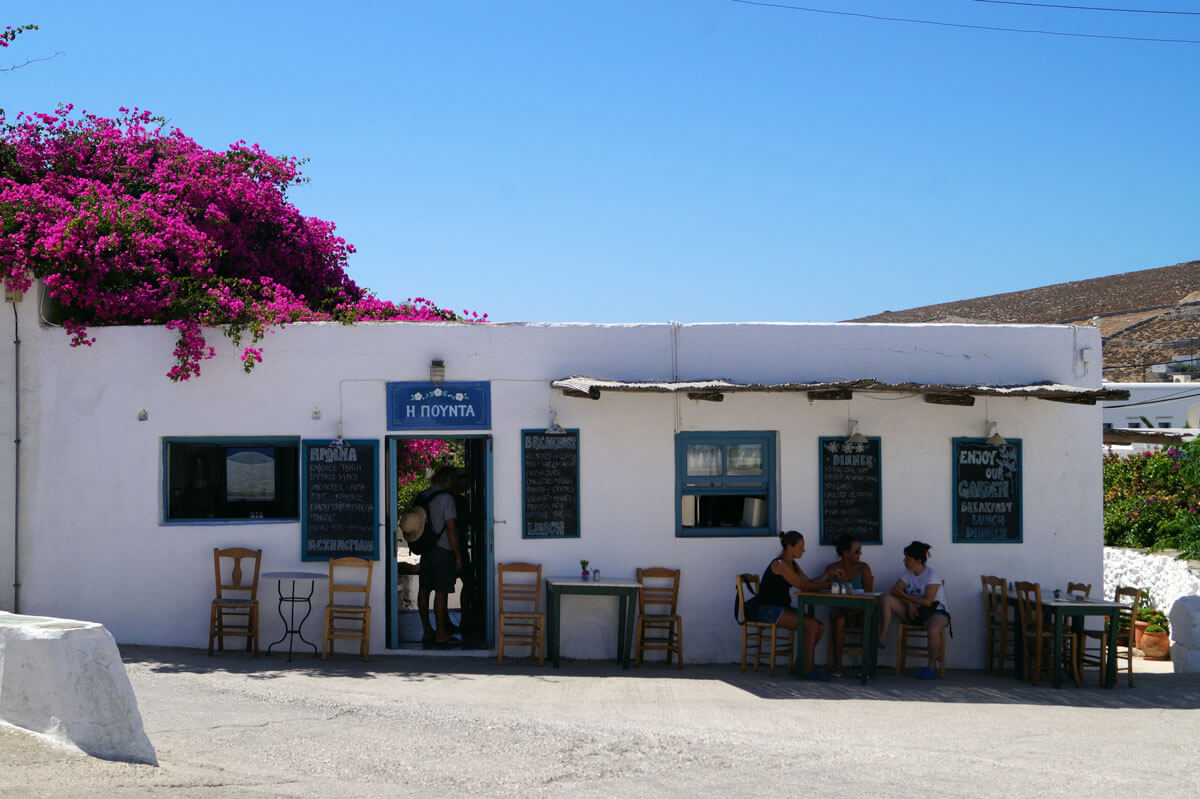Orthodox Easter in Greece
Easter in Greece unfolds as a deeply significant period, steeped in Orthodox Christian traditions and the palpable anticipation of spring's renewal. The lead-up to this day, known as Holy Week, commences on April 29th, setting the stage for a profound spiritual journey that captivates the entire nation. This sacred week is a mosaic of rituals, each day building upon the last, to culminate in the Resurrection celebrations. From the reflective moments of Holy Monday, marking the beginning of Holy Week, to the solemn commemorations on Holy Friday and the transformative joy of Easter Sunday, the essence of renewal and community spirit is omnipresent.
As the Greek Orthodox community observes these time-honored traditions according to the Julian calendar, the distinctiveness of Greek Easter shines through. This celebration not only honors the Resurrection of Christ but also symbolizes the rebirth of nature and the human spirit. It's a time when fasting, reflection, and the breaking of the Lenten fast weave together a narrative of faith, hope, and communal solidarity.
Thus, Easter in Greece transcends its religious roots, becoming a vibrant cultural festival that embodies the profound connection between ancient customs and the contemporary Greek ethos.
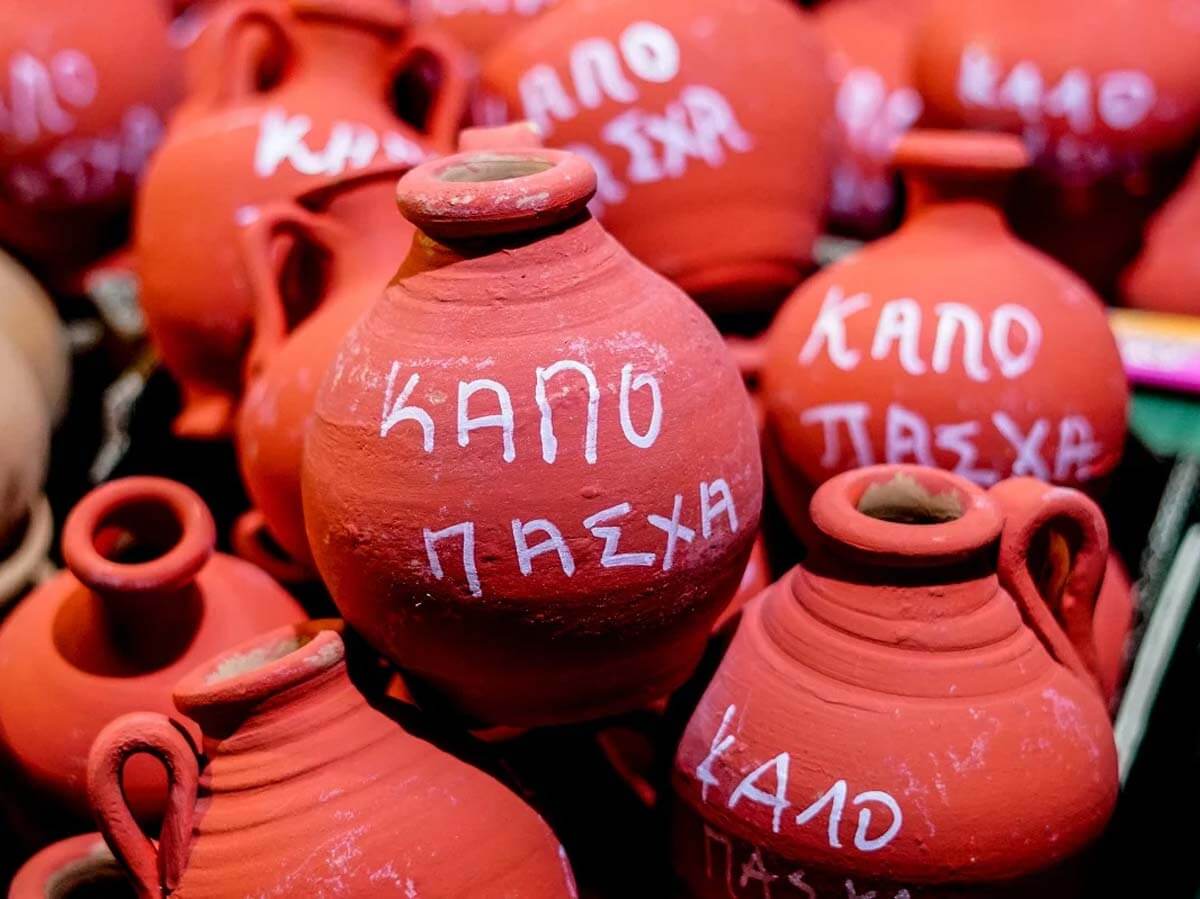
Easter Destinations in Greece
For Easter in Greece, you'll find the celebration is not just a religious event but a vibrant part of the national culture, steeped in centuries-old traditions and rituals. Here are some of the best places to immerse yourself in the festivities, each offering its own unique take on the Easter celebrations:
Athens
The capital city, Athens, combines solemn religious observances with lively celebrations. Witness the Epitaphios processions in neighborhoods like Plaka, beneath the Acropolis, and experience the midnight Resurrection service in major cathedrals. The city is alive with fireworks at midnight to mark Christ's Resurrection, offering a blend of urban energy and devout observance.
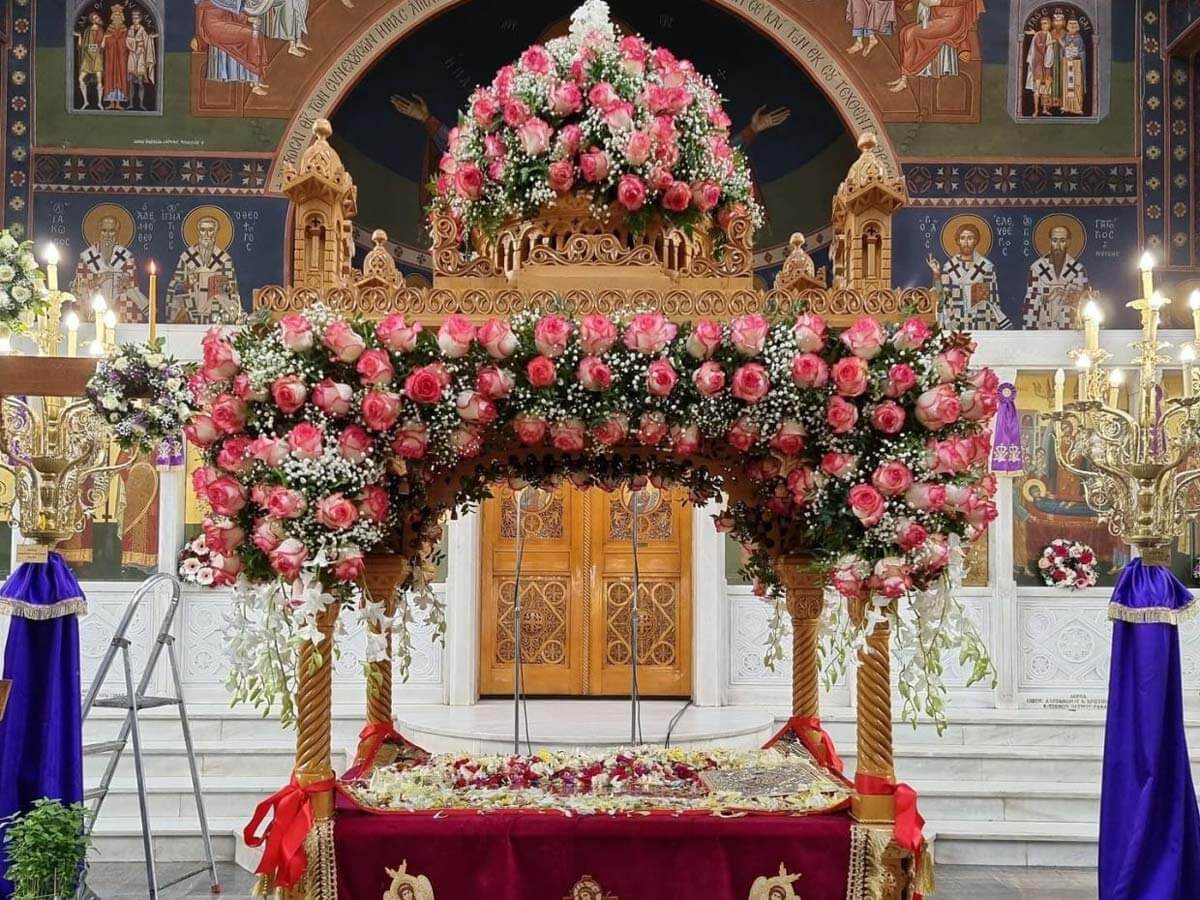
Mystras
Mystras, near Sparta, stands as a breathtaking Byzantine city ruin, offering a mystical setting for Easter celebrations. The ancient churches and monasteries here participate in the Holy Week services, with the Easter Vigil held at the Metropolitan Church, providing a backdrop that feels like stepping back in time.
Nafplio
In Nafplio, one of Greece's most picturesque cities, Easter is celebrated with a palpable sense of community and tradition. The city's streets and squares come alive with processions, particularly on Good Friday and Easter Sunday. The historic setting of Nafplio, combined with its vibrant local traditions, makes it a charming destination for Easter.
Patmos island
For those seeking a more contemplative Easter experience, the island of Patmos offers a deeply spiritual journey. As the site where St. John wrote the Book of Revelation, Patmos' Holy Week observances are imbued with an atmosphere of solemnity and mystique. The ancient Monastery of St. John and the sacred Cave of the Apocalypse become focal points for pilgrims, offering a unique opportunity to connect with the roots of Christian faith amidst the tranquil beauty of the Aegean.
Corfu island
The island of Corfu in the Ionian Sea offers a blend of historical grandeur and unique Easter celebrations that are steeped in centuries-old traditions and influenced by the various cultures that have occupied the island. Easter in Corfu is a spectacular affair, with its most famous tradition being the "Botides" - a joyful yet startling custom where earthenware pots are hurled from windows and balconies to crash on the streets below, symbolizing the breaking of the old and the ushering in of the new. The air fills with the sounds of philharmonic orchestras, adding a rich musical backdrop to the visual spectacle.
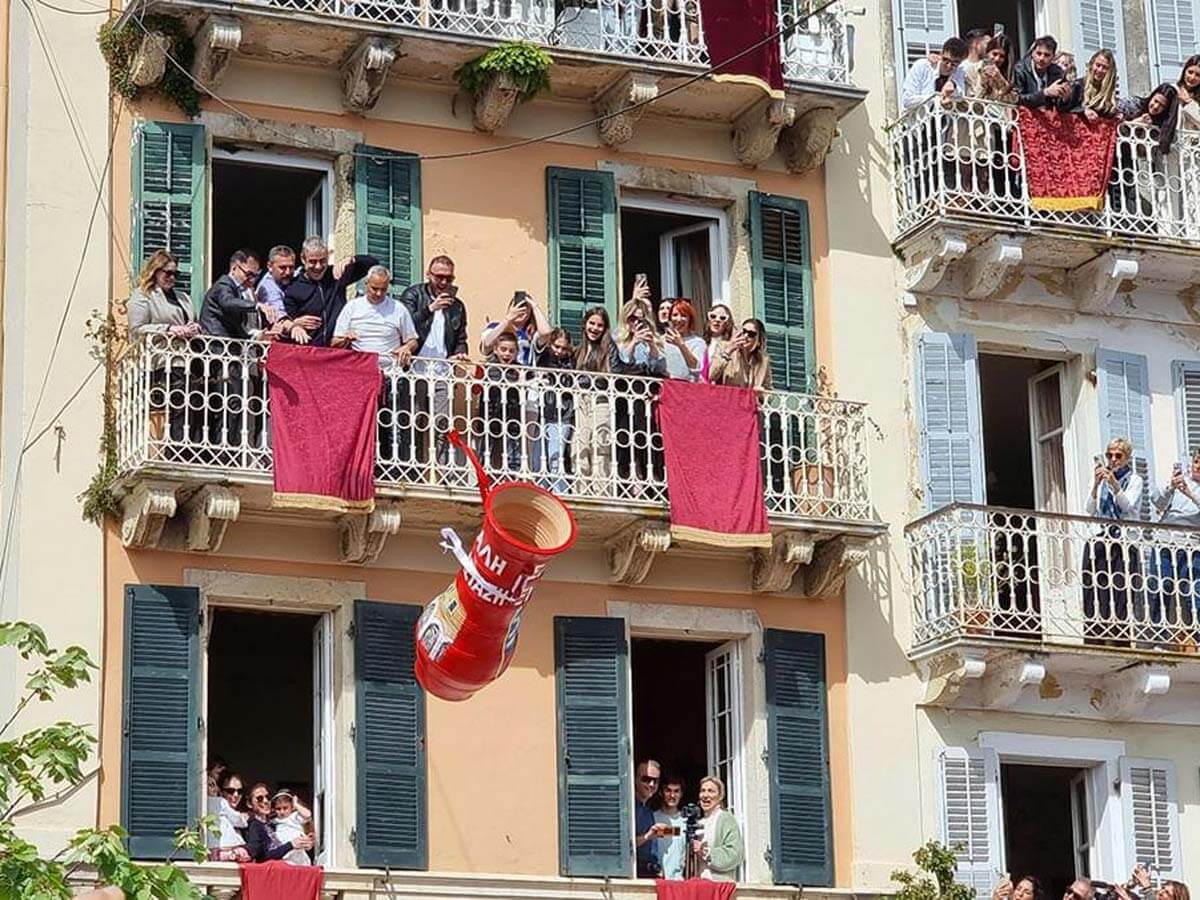
Chios island
The island is famed for the "Rocketwar," a tradition that lights up the night sky and involves two rival parishes engaging in a friendly yet fierce competition, firing thousands of rockets towards each other. This breathtaking display is not just about rivalry but also symbolizes the villagers' communal spirit and their collective participation in marking the Resurrection in a uniquely explosive manner.
Meteora
For those interested in a more contemplative experience, the UNESCO-protected monasteries of Meteora provide a stunning setting for Easter services. The combination of Byzantine chants and breathtaking scenery makes for an unforgettable spiritual journey.
Each of the abovementioned destinations offers its own unique window into the soul of Greek Easter, weaving together threads of history, spirituality, and community celebration. Whether you're drawn to the solemnity of ancient rituals or the joyous expressions of communal feasts, Easter in Greece is a mosaic of experiences waiting to be discovered.
Hint! Looking for a great, personalized itinerary in Greece during Easter? Feel free to contact us and let us inspire you with a unique and immersive itinerary!
Expanded Unique Traditions and Holy Week
Epitaphios
One of the most poignant observances occurs on Holy Friday, with the preparation and procession of the "Epitaphios." This sacred ritual involves a richly adorned bier, representing Christ's tomb, which is lavishly decorated with flowers to symbolize the Garden of Eden and the victory of life over death. The community comes together in a moving display of devotion, as the "Epitaphios" is carried through the streets, accompanied by hymns and prayers. This procession not only symbolizes Christ's burial but also serves as a collective meditation on mortality and the hope of resurrection. The faithful, bearing candles, follow the "Epitaphios" in a solemn march, enveloped in a shared sense of mourning and reverence. In case you find yourself in Athens during this period, do not miss the opportunity to join the Epitaphios of Saint Anargyroi, in the picturesque alleys of Plaka neighborhood!
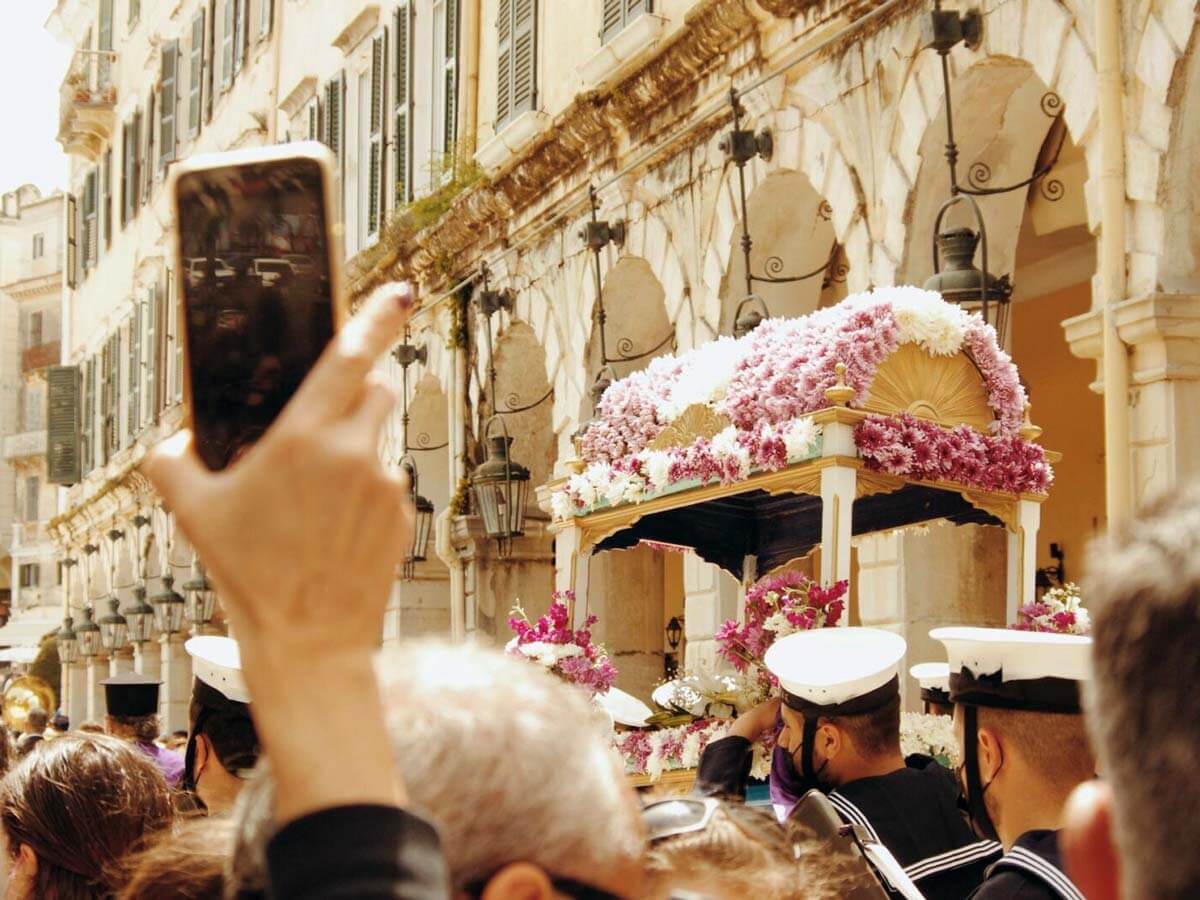
Holy Saturday
As Holy Week progresses, anticipation builds towards the Midnight Service of the Resurrection on Holy Saturday. Churches buzz with activity as the faithful gather, each person holding a white candle, or "lambada," symbolizing the light of Christ. The church is initially shrouded in darkness, representing the tomb. Then, at the stroke of midnight, the priest announces "Christos Anesti" (Christ is Risen), and the light from the Holy Flame is passed from candle to candle, illuminating the faces of the congregation with the light of the Resurrection. This moment of "Anastasi" is electric, a collective exhalation of joy and relief, as the somber tones of Holy Week give way to the triumphant declaration of Easter. The air fills with the sounds of bells and fireworks, as the community celebrates the victory of life over death.
Red Easter Eggs and the Game of Tsougrisma
The tradition of dyeing eggs red and the subsequent game of 'tsougrisma', where individuals tap eggs against each other to see whose egg remains uncracked, are emblematic of Greek Easter's blend of spirituality and communal fun. These customs not only symbolize the blood and resurrection of Christ but also foster a sense of connection and playful competition among family and friends.
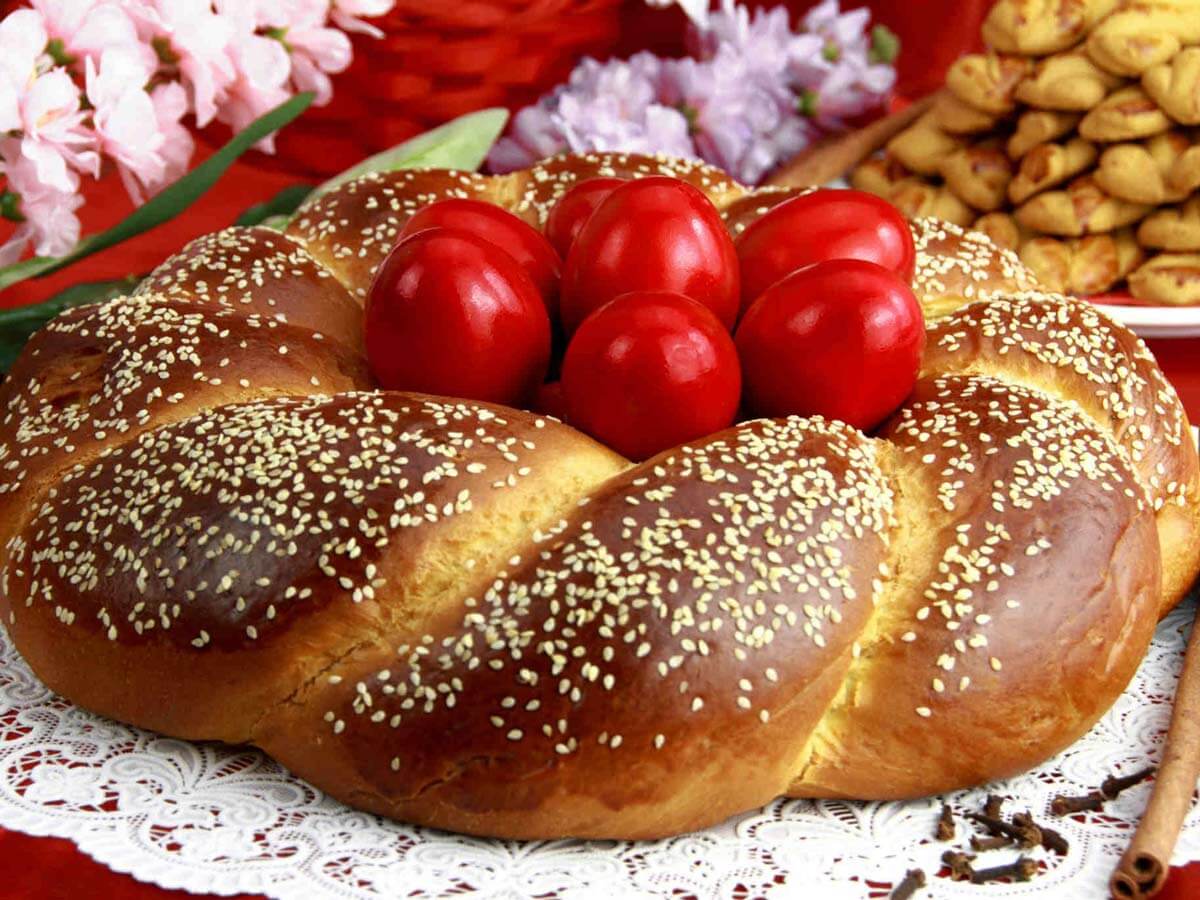
Magiritsa soup
The Magiritsa soup, prepared from the lamb's offal, is another unique tradition, served after the midnight service to break the 40-day Lenten fast. This meal, rich in symbolism and flavor, is a communal breaking of bread that reinforces the bonds of family and community, welcoming the breaking dawn of Easter Sunday with nourishment for both body and soul.
Easter Sunday - Lamb on the Spit and Easter Feast
Easter Sunday is a time of communal feasting, where the preparation and enjoyment of the lamb on the spit is a day-long affair that brings communities together. Accompanied by traditional dances, music, and the clinking of wine glasses, these feasts are a celebration of life, embodying the spirit of rebirth and the joys of springtime.
Burning of Judas
This is a tradition observed in many parts of Greece on Easter Sunday and involves the creation and burning of an effigy representing Judas Iscariot, the apostle who betrayed Christ. This act of symbolic purification and renewal is a vivid example of the way in which Easter traditions in Greece navigate the spectrum of human emotions, from betrayal and loss to forgiveness, resurrection, and joy.
As these traditions unfold from the depths of Holy Week to the exuberant celebrations of Easter Sunday, they weave a story of enduring faith, nature’s renewal, and the unbreakable bonds of community. Greek Easter is a testament to the country's ability to balance solemnity with celebration, inviting all who experience it to reflect on the deeper meanings of life, death, and rebirth. In doing so, it offers a rich, multifaceted experience that stays with participants long after the festivities have concluded, nestled in the heart as a cherished memory of what it means to be part of something greater than oneself.
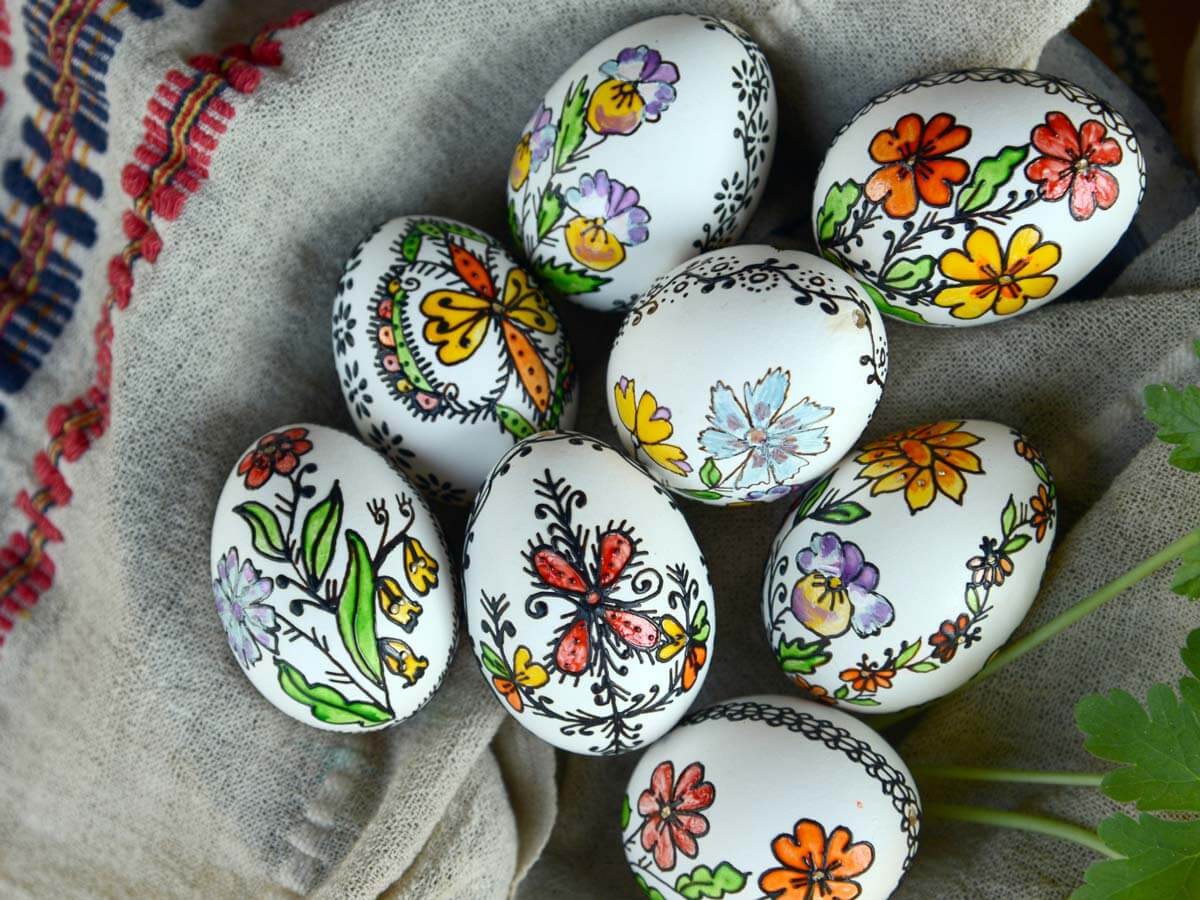
Easter in Greece is a vivid mosaic of faith, tradition, and the celebratory embrace of spring—a time when the historical depth and vibrant culture of the nation are on full display. From the thunderous "Rocketwar" in Chios to the serene spiritual observances in Patmos, and the familial warmth of Easter feasts in Crete, the celebration transcends mere ritual to become a heartfelt expression of renewal and community.
As the last echoes of "Christos Anesti" fade and the remnants of red eggshells are swept away, the spirit of Greek Easter lingers - a reminder of the enduring connections between people, their faith, and the natural world around them. It's this spirit that continues to draw travelers from around the globe, seeking not just to witness but to partake in the richness of Greek Easter, an experience that promises not only a deeper understanding of Greek culture but also an intimate encounter with the universal themes of rebirth, joy, and communal solidarity.
In the end, Greek Easter offers more than just a glimpse into the country's religious and cultural traditions; it provides a momentary unity with something greater than oneself - a celebration of life's perpetual renewal and the shared human journey through the seasons of the soul.
You may also find useful:
About the author: Our team at Greek TravelTellers consists of academics and lovers of Greek culture. Our vision is to convey our knowledge and Greek values through unique tours and experiences. Through our blog, we hope to bring Greek history and culture closer to you. Feel free to learn more about us.




